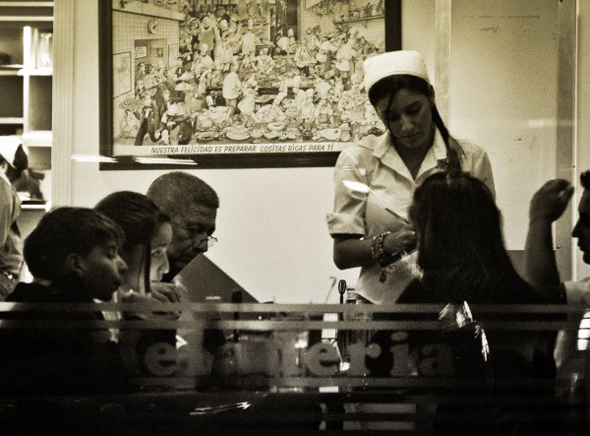The GOP Isn’t Just Taking Aim at Reproductive Rights — It’s After Women’s Very Economic Survival
While the phrase has faded in this election year go-round, the war on women has not.
By Martha Burk / OtherWords

Guian Bolisay / Flickr
This piece originally ran on OtherWords.
We heard a lot about the “war on women” during the 2012 election cycle — mostly over Republican attacks on abortion rights and birth control.
While the phrase has faded in this election year go-round, the war on women has not. The only change is that now we’re fighting on two fronts — reproductive rights and economic survival.
To a man, the three Republicans still in the nomination race [before the Indiana primary made Donald Trump the presumptive nominee] oppose abortion rights.
No surprise there. But Ted Cruz … upped the ante [and came] out against exceptions for rape and incest. John Kasich would allow the exceptions, but said there’s no point in talking to him about choice.
The formerly pro-choice Trump is now not only against abortion, but blurted out recently what others undoubtedly believe but are too dishonest to say out loud — that the government should punish the women who have abortions. And probably the girls, too.
While reproductive rights are fundamental to women’s well-being and autonomy, the right to fair pay and benefits is no less so.
After all, adult women are by far the majority of those working for the federal minimum wage. It’s parked at $7.25 per hour because the feds haven’t raised it since 2009.
The legal base pay for tipped workers lags even further behind — it’s been a measly $2.13 since 1991.
Women make up 70 percent of tipped servers, and most of them don’t work in those high-dollar, white-tablecloth restaurants. They’re working in low-level hash houses and places like Denny’s and Red Lobster.
A Census report last year showed that the poverty risk for women spikes once they enter the workforce. For women with kids, the poverty rate is almost double that of men in the 25-34 age range — prime working years.
Some experts say the growing gap may be partly due to continuing high unemployment rates among single mothers. Could be — but I’m betting a bigger factor is the poverty-level minimum wage, which disproportionally affects women of color.
Every presidential candidate has weighed in on the minimum wage. While Hillary Clinton and Bernie Sanders argued over how much is enough — $12 for her, $15 for him — Cruz said $0 is the right number. He’d do away with the federal minimum altogether, having deemed it a “bad policy.”
In typical Trump fashion, the GOP candidate has said America needs “good paying jobs,” while declaring a preference for leaving the minimum at $7.25. Not to be outdone on the contradiction front, Kasich said it’s “very important that we don’t raise the minimum wage willy-nilly,” but then added that Uncle Sam ought to let the 50 states set 50 different minimums if that’s what they want.
All this adds up to a multi-pronged attack on low-wage working women, who are the least able to fight back. They’re trapped by the ironclad partisanship on Capitol Hill, where Republicans have promised not to raise wages as long as they control Congress. And pushing back on those abortion restrictions states have been rolling out? Forget it.
Between Congress and the nut-case wing of the GOP calling the shots in the presidential race, the war on women promises to be a long one indeed.
Martha Burk is the director of the Corporate Accountability Project for the National Council of Women’s Organizations (NCWO) and the author of the book Your Voice, Your Vote: The Savvy Woman’s Guide to Power, Politics, and the Change We Need. Follow Martha on Twitter @MarthaBurk.
Your support matters…Independent journalism is under threat and overshadowed by heavily funded mainstream media.
You can help level the playing field. Become a member.
Your tax-deductible contribution keeps us digging beneath the headlines to give you thought-provoking, investigative reporting and analysis that unearths what's really happening- without compromise.
Give today to support our courageous, independent journalists.






You need to be a supporter to comment.
There are currently no responses to this article.
Be the first to respond.